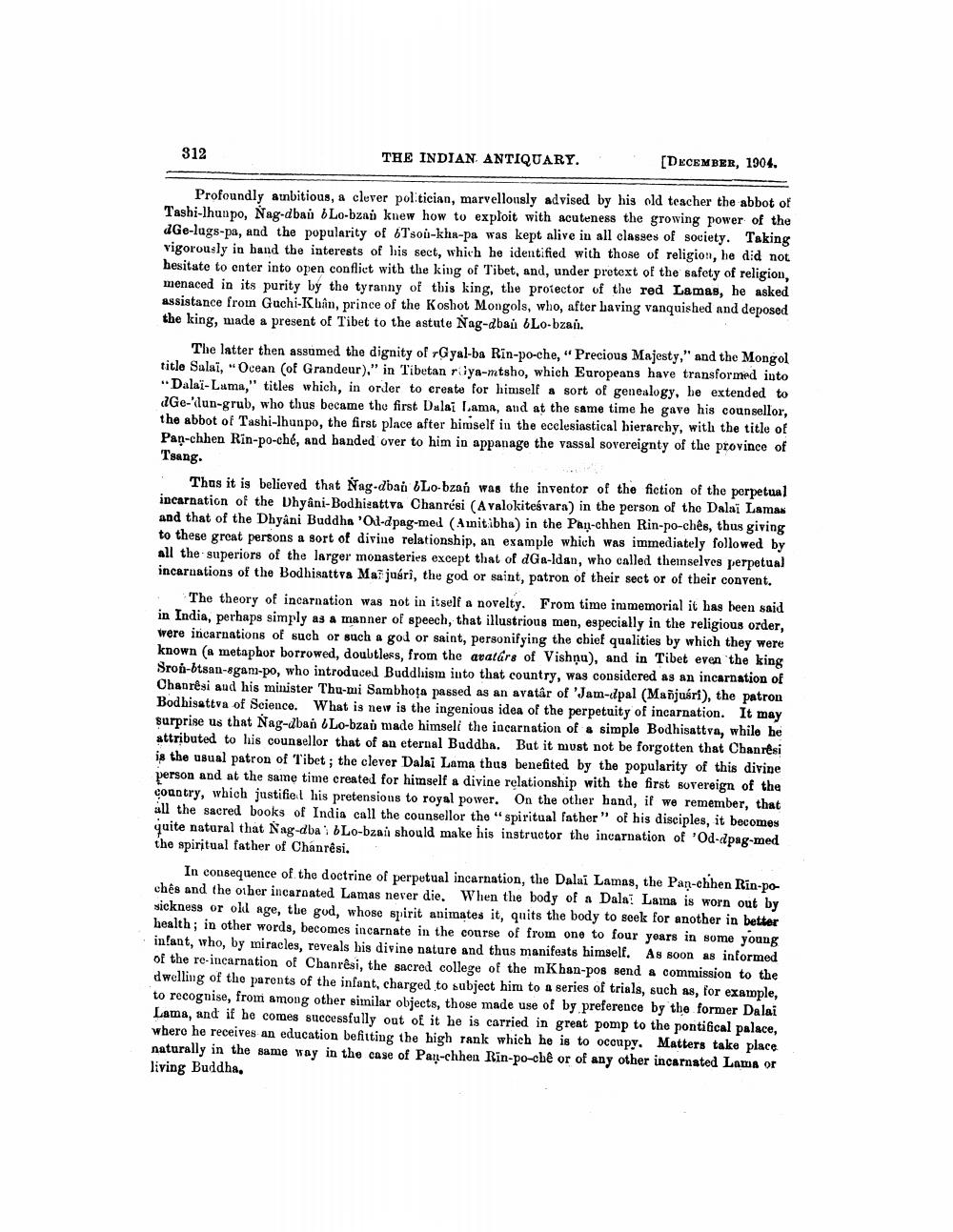________________
312
THE INDIAN ANTIQUARY.
[DECEMBER, 1904.
Profoundly ambitious, a clever politician, marvellously advised by his old teacher the abbot of Tashi-lhunpo, Nag-dbaú bLo-bzao knew how to exploit with acuteness the growing power of the dGe-lugs-pa, and the popularity of Tsou-kha-pa was kept alive in all classes of society. Taking vigorously in band the interests of his sect, which he identified with those of religion, he did not hesitate to enter into open conflict with the king of Tibet, and, under pretext of the safety of religion, menaced in its purity by the tyranny of this king, the protector of the red Lamas, he asked assistance from Guchi-Khân, prince of the Koshot Mongols, who, after having vanquished and deposed the king, made a present of Tibet to the astute Nag-dbau 6Lo-bzai.
The latter then assumed the dignity of Gyal-ba Rin-po-che, Precious Majesty," and the Mongol title Salai, Ocean (of Grandeur)." in Tibetan riya-mtsho, which Europeans have transformed into "Dalai-Lama," titles which, in order to create for himself a sort of genealogy, be extended to age-"lun-grub, who thus became the first Dalai Lama, and at the same time he gave his counsellor, the abbot of Tashi-lhunpo, the first place after himself in the ecclesiastical hierarchy, with the title of Pan-chhen Rin-po-ché, and handed over to him in appanage the vassal sovereignty of the province of
Tsang.
Thus it is believed that Nag-dbań Lo.bzon was the inventor of the fiction of the perpetual incarnation of the Dhyani-Bodhisattva Chanrési (Avalokitesvara) in the person of the Dalai Lamas and that of the Dhyani Buddha 'Ol-dpag-med (Ainitibha) in the Pan-chhen Rin-po-chês, thus giving to these great persons a sort of divine relationship, an example which was immediately followed by all the superiors of the larger monasteries except that of Ga-ldan, who called theinselves perpetual incaruations of the Bodhisattva Majuári, the god or saint, patron of their sect or of their convent.
The theory of incarnation was not in itself a novelty. From time inmemorial it has been said in India, perhaps simply as a manner of speech, that illustrious men, especially in the religious order, were incarnations of such or such a god or saint, personifying the chief qualities by which they were known (a metaphor borrowed, doubtless, from the aratárs of Vishnu), and in Tibet even the king Sroubtsan-sgan-po, who introduced Buddhism into that country, was considered as an incarnation of Chanrėsi aud his minister Thu-mi Sambhota passed as an avatar of 'Jam-upal (Manjusri), the patron Bodhisattva of Science. What is new is the ingenious idea of the perpetuity of incarnation. It may surprise us that Nag-aban (Lo-bzan made himseli the incarnation of a simple Bodhisattva, while he attributed to his counsellor that of an eternal Buddha. But it must not be forgotten that Chanresi is the usual patron of Tibet; the clever Dalai Lama thus benefited by the popularity of this divine person and at the same time created for himself a divine relationship with the first sovereign of the country, which justifiel his pretensions to royal power. On the other hand, if we remember, that all the sacred books of India call the counsellor the "spiritual father" of his disciples, it becomes quite natural that Nag-dba bLo-bzai should make his instructor the incarnation of 'Od-dpag-med the spiritual father of Chanrêsi.
In consequence of the doctrine of perpetual incarnation, the Dalai Lamas, the Pan-chhen Rin-poches and the other incarnated Lamas never die. When the body of a Dalai Lama is worn out by sickness or old age, the god, whose spirit animates it, quits the body to seek for another in better health; in other words, becomes incarnate in the course of from one to four years in some young infant, who, by miracles, reveals bis divine nature and thus manifests himself. As soon as informed of the re-incarnation of Chanrêsi, the sacred college of the mKhan-pos send a commission to the dwelling of the parents of the infant, charged to subject him to a series of trials, such as, for example, to recognise, from among other similar objects, those made use of by preference by the former Dalai Lama, and if he comes successfully out of it he is carried in great pomp to the pontifical palace, where he receives an education befitting the high rank which he is to occupy. Matters take place naturally in the same way in the case of Pan-chhen Rin-po-chê or of any other incarnated Lama or living Buddha




